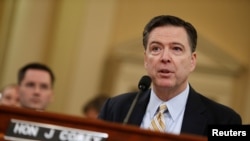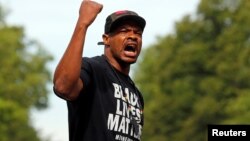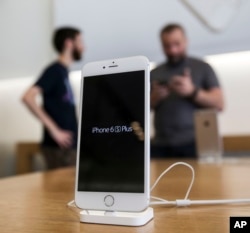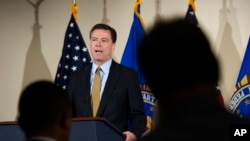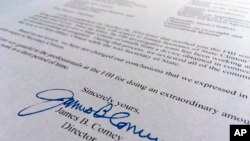James Comey, who served as the seventh director of the Federal Bureau of Investigation, as at the center of the highly charged investigation into possible collaboration between President Donald Trump’s presidential campaign and Russia. U.S. intelligence agencies – including the FBI – concluded in January that Russia attempted to meddle in the 2016 presidential election with the aim of helping Trump win the presidency.
Comey, a former Republican, was nominated by President Barack Obama in 2013 and fired by Trump on May 9, 2017. By Trump’s own admission, an FBI investigation into possible ties between his campaign and Russia was on the president’s mind when he decided to dismiss Comey.
Praised for his independence and integrity, Comey spent three decades in law enforcement and has been no stranger to controversy.
Some career highlights:
OPPOSED SECRET SPY PROGRAM IN STANDOFF WITH BUSH OFFICIALS
Before being fired by Trump, Comey was perhaps best known for a remarkable 2004 standoff with top officials in the George W. Bush administration over a federal domestic surveillance program.
As the deputy attorney general, Comey rushed to the hospital bed of Attorney General John Ashcroft to physically stop White House officials in their bid to get Ashcroft to reauthorize a secret no-warrant wiretapping program.
Comey described the incident in 2007 testimony to Congress, explaining that he believed the spy program put in place after the Sept. 11, 2001, terror attacks was legally questionable.
When he learned that Andrew Card, the president's chief of staff, and Alberto Gonzales, the White House counsel, were heading to Ashcroft's hospital room despite his wife's instructions that there be no visitors, Comey told Congress, Comey beat them there and watched as Ashcroft turned them away.
"That night was probably the most difficult night of my professional life," Comey said.
PUBLICLY DISAGREED WITH OBAMA ADMINISTRATION OVER POLICE CONDUCT
Comey irritated Obama officials after he suggested last year that increases in violent crime across the country could be fueled in part by anxiety among law enforcement officers who increasingly fear being recorded by citizens.
Reiterating that view in May, Comey said officers may hesitate to get out of their patrol vehicles to interact with people. His comments came in the wake of episodes of police violence, several against African-Americans, that spurred outcry and in some cases riots.
"I'm not against videotaping police, I'm not against scrutiny. We get better that way," Comey said. "What I'm asking is, is there something unintentional affecting our communities that is contributing to the spike in violent crime?"
That position put him at odds with his boss, Attorney General Loretta Lynch, as well as the White House, which said the remarks lacked evidence and could undermine their efforts to revamp the criminal justice system.
ANGERED TECH INDUSTRY OVER ACCESS TO TERROR SUSPECT'S IPHONE
The FBI director clashed with the technology industry in a legal battle over access to the work-issued iPhone of San Bernardino, California, gunman Syed Farook.
As the public face of the federal government, Comey went to court in 2016 to force Apple Inc. to help it open the locked iPhone of Farook after the California attack in December 2015, which killed 14 people. Farook and his wife died in a gun battle with police.
Apple accused the government in court filings of seeking "dangerous power," a high-stakes dispute pitting national security against digital privacy. Comey said the issue was the "hardest question I've seen in government."
A federal magistrate granted Comey's request, but the court fight ended weeks later when an unidentified third party came forward with a solution to access the device.
DECLINED TO RECOMMEND CHARGES OVER CLINTON EMAILS
Comey received criticism from both parties over the FBI's handling of the yearlong investigation into former Secretary of State Hillary Clinton's email account as secretary of state. Clinton was the Democratic nominee – and Trump’s main opponent – in the 2016 election.
Comey announced in July that the FBI was recommending no criminal charges for Clinton's handling of highly classified material in a private email account. That drew the dismay of Republicans in a presidential election year, who said the FBI director may have unnecessarily rushed a decision without a more complete airing of the evidence.
Comey in his announcement also harshly criticized Clinton's "extremely careless" behavior, irritating Democrats who said the comments were unwarranted since she was not being charged.
REOPENED INVESTIGATION INTO CLINTON EMAILS
Two weeks before the 2016 election, Comey sent a letter to members of Congress notifying them that the FBI was reviewing a newly discovered collection of emails found on electronic devices owned by the husband of a top Clinton aide.
Shortly before Election Day, Comey announced the new emails did not alter the FBI’s conclusion that Clinton should not be charged.
Some Democrats – including Clinton – say Comey’s last-minute reopening of the email probe caused her to lose the election.




